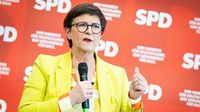In the wake of a historic election defeat, the future of Saskia Esken, co-chair of the Social Democratic Party (SPD), is under intense scrutiny. Party insiders are debating her viability for continued leadership, while some factions within the party are pushing for a new direction. Following criticism from prominent party members, the internal conflict has sparked a significant divide among SPD leaders.
Maria Noichl, chair of the SPD Women’s Working Group, has publicly advocated for Esken to maintain her leadership position, citing her "große Verdienste" (great merits) within the party. Noichl emphasized that it is essential for Esken to remain visible in the leadership, stating, "Esken soll und muss weiter in der ersten Reihe der SPD dabei sein" (Esken should and must continue to be in the front row of the SPD). This call for solidarity comes as speculation mounts about potential changes in the party's leadership.
On the other hand, Generalsekretär Lars Klingbeil is reportedly considering offering Esken a ministerial position in the new government. According to sources, he may need to do so to avoid further factionalism within the party. Speculation suggests that if Svenja Schulze, currently the Minister for Development, moves to the Environment Ministry, a position could open up for Esken as the new Minister for Development. While this role is the smallest in the cabinet, it would still keep Esken in a significant position, albeit with reduced influence.
However, the dynamics within the party are shifting, with younger figures like Verena Hubertz emerging as potential new leaders. At just 37, Hubertz represents a fresh, more modern SPD, and there are discussions about her possibly stepping into a dual leadership role alongside Matthias Miersch if Klingbeil decides to step down as party chair.
In a recent interview, Sascha Binder, the SPD's secretary in Baden-Württemberg, sharply criticized Esken's suitability for a ministerial role, igniting further internal conflict. Binder stated, "Kabinettsposten müssen an diejenigen gegeben werden, die ein großes Vertrauen innerhalb der Partei haben, aber vor allem auch bei den Menschen draußen" (Cabinet positions must be given to those who have great trust within the party and, above all, among the people outside). He acknowledged that four of the seven cabinet posts should go to women, but he did not see Esken as one of the top candidates for those positions.
His comments have drawn ire from other party members, particularly Leni Breymaier, who accused Binder of sexism and undermining women in the party. "Wenn ein paar Männer ihr Mütchen kühlen wollen und vielleicht noch andere mit Posten versorgen möchten, haben sie das nicht an Saskia Esken auszulassen" (If a few men want to vent their frustrations and perhaps provide other posts, they should not take it out on Saskia Esken), she remarked, calling for internal discussions to remain within the party rather than being aired publicly.
The fallout from Binder's remarks has exposed deep rifts within the SPD, highlighting the ongoing struggle between traditional and progressive factions. Breymaier's defense of Esken underscores the growing tension as some members rally to support her, while others, like Serdar Yüksel, have called for her resignation, further complicating the party's internal politics.
Esken's leadership has been controversial since her unexpected election as party chair in 2019, and her position remains precarious. Critics within her own electoral district have voiced strong opposition, with Gerhard Gaiser, a local party leader, stating, "Saskia Esken klebt wie Pattex am Parteivorsitz. Dabei ist sie weder an der Parteibasis noch in der Bevölkerung beliebt" (Saskia Esken sticks to the party chair like glue. She is neither popular at the party base nor among the public).
As the SPD prepares for a Bundesparteitag in June where leadership roles will be contested, the outcome of these internal disputes will significantly impact the party's future direction. Manuela Schwesig, the Minister-President of Mecklenburg-Vorpommern, has expressed her support for Klingbeil to remain party chair, stating, "Ich wünsche mir, dass Lars Klingbeil Parteivorsitzender bleibt" (I wish for Lars Klingbeil to remain party chair), emphasizing his effective leadership in recent years.
While Schwesig and other party leaders have rallied around Klingbeil, support for Esken appears more fragmented. Maria Noichl stands as one of the few prominent voices advocating for her continued presence in leadership, suggesting that the party cannot afford to lose experienced women leaders during this critical time. The internal struggle could distract the SPD from focusing on its governmental responsibilities, as it grapples with its identity and future direction.
As the SPD navigates these turbulent waters, the question remains: can the party reconcile its internal differences and present a united front to the electorate? The coming months will be crucial in determining whether Saskia Esken will remain a key figure in the SPD or whether new leadership will take the reins, potentially reshaping the party's trajectory.






